
The Malleus Maleficarum, usually translated as the Hammer of Witches, is the best known treatise purporting to be about witchcraft. It was written by the German Catholic clergyman Heinrich Kramer and first published in the German city of Speyer in 1486. Some describe it as the compendium of literature in demonology of the 15th century. Kramer blamed women for his own lust and presented his views as the Church's position.
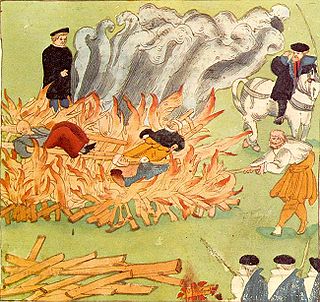
A witch-hunt, or a witch purge, is a search for people who have been labeled witches or a search for evidence of witchcraft. Practicing evil spells or incantations was proscribed and punishable in early human civilizations in the Middle East. In medieval Europe, witch-hunts often arose in connection to charges of heresy from Christianity. An intensive period of witch-hunts occurring in Early Modern Europe and to a smaller extent Colonial America, took place about 1450 to 1750, spanning the upheavals of the Counter Reformation and the Thirty Years' War, resulting in an estimated 35,000 to 50,000 executions. The last executions of people convicted as witches in Europe took place in the 18th century. In other regions, like Africa and Asia, contemporary witch-hunts have been reported from sub-Saharan Africa and Papua New Guinea, and official legislation against witchcraft is still found in Saudi Arabia and Cameroon today.
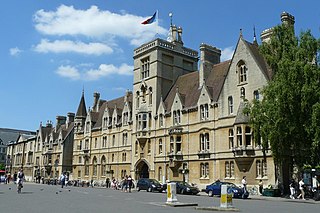
Balliol College is a constituent college of the University of Oxford. Founded in 1263 by John I de Balliol, it has a claim to be the oldest college in Oxford and the English-speaking world.
Christian views on magic vary widely among Christian denominations and among individuals. Many Christians actively condemn magic as satanic, holding that it opens the way for demonic possession. Some Christians simply view it as entertainment. Conversely, some branches of esoteric Christianity actively engage in magical practices.
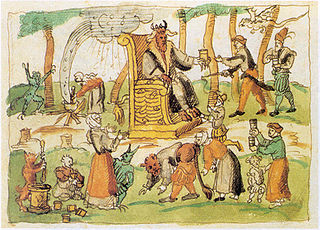
A Witches' Sabbath is a purported gathering of those believed to practice witchcraft and other rituals. The phrase became especially popular in the 20th century.
Sir Frederick Maurice Powicke was an English medieval historian. He was a fellow of Merton College, Oxford, a professor at Queen's University, Belfast, and the Victoria University of Manchester, and from 1928 until his retirement Regius Professor at the University of Oxford. He was made a Knight Bachelor in 1946.
The Regius Professor of History at the University of Oxford is a long-established professorial position. Holders of the title have often been medieval historians. The first appointment was made in 1724. The term "Regius" reflects the origins of the post as a royal appointment, itself a recognition of the important influence of history.
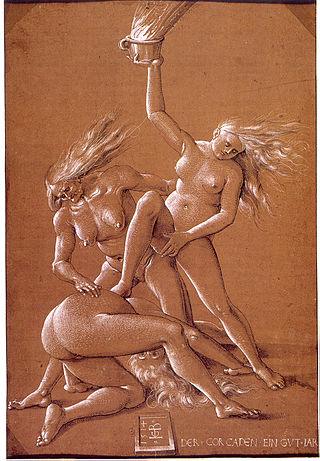
European witchcraft is a multifaceted historical and cultural phenomenon that unfolded over centuries, leaving a mark on the continent's social, religious, and legal landscapes. The roots of European witchcraft trace back to classical antiquity when concepts of magic and religion were closely related, and society closely integrated magic and supernatural beliefs. Ancient Rome, then a pagan society, had laws against harmful magic. In the Middle Ages, accusations of heresy and devil worship grew more prevalent. By the early modern period, major witch hunts began to take place, partly fueled by religious tensions, societal anxieties, and economic upheaval. Witches were often viewed as dangerous sorceresses or sorcerers in a pact with the Devil, capable of causing harm through black magic. A feminist interpretation of the witch trials is that misogynist views of women led to the association of women and malevolent witchcraft.

Dame Frances Clare Kirwan, is a British mathematician, currently Savilian Professor of Geometry at the University of Oxford. Her fields of specialisation are algebraic and symplectic geometry.
Vivian Hunter Galbraith was an English historian, fellow of the British Academy and Oxford Regius Professor of Modern History.
Dame Olwen Hufton, is a British historian of early modern Europe and a pioneer of social history and of women's history. She is an expert on early modern, western European comparative socio-cultural history with special emphasis on gender, poverty, social relations, religion and work. Since 2006 she has been a part-time Professorial Research Fellow at Royal Holloway, University of London.

Hans Christian Erik Midelfort, is C. Julian Bishko Professor Emeritus of History and Religious Studies at the University of Virginia. He is a specialist of the German Reformation and the history of Christianity in Early Modern Europe.
In the early modern period, from about 1400 to 1775, about 100,000 people were prosecuted for witchcraft in Europe and British America. Between 40,000 and 60,000 were executed. The witch-hunts were particularly severe in parts of the Holy Roman Empire. Prosecutions for witchcraft reached a high point from 1560 to 1630, during the Counter-Reformation and the European wars of religion. Among the lower classes, accusations of witchcraft were usually made by neighbors, and women made formal accusations as much as men did. Magical healers or 'cunning folk' were sometimes prosecuted for witchcraft, but seem to have made up a minority of the accused. Roughly 80% of those convicted were women, most of them over the age of 40. In some regions, convicted witches were burnt at the stake.
Children have been accused of witchcraft, both historically and in contemporary times, in societies that harbor beliefs about the existence of witches and black magic. These accusations have led to punishment, imprisonment, torture, and execution of children.
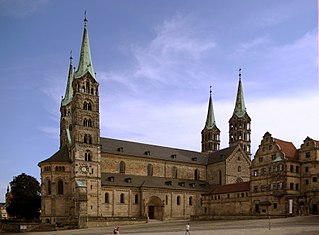
The Bamberg witch trials of 1627–1632, which took place in the self-governing Catholic Prince-Bishopric of Bamberg in the Holy Roman Empire in present-day Germany, is one of the biggest mass trials and mass executions ever seen in Europe, and one of the biggest witch trials in history.

Thomas Martin Lindsay FRSE (1843–1914) was a Scottish historian, professor and principal of the Free Church College, Glasgow. He wrote chiefly on church history, his major works including Luther and the German Reformation (1900), and A History of the Reformation (1906–1907).
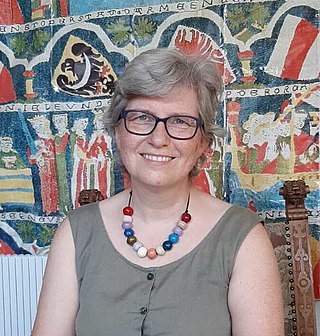
Henrike Lähnemann is a German medievalist and holds the Chair of Medieval German, University of Oxford. She is a Fellow of St Edmund Hall, Oxford.

Johann Christoph von Westerstetten was Prince-bishop of Eichstätt, Bavaria, Germany, during the Thirty Years' War. He was a proponent of the Counter-Reformation.
Martin Warnke was a German art historian.

Malcolm John Gaskill FRHistS is an English academic historian and writer on crime, magic, witchcraft, spiritualism, and the supernatural. Gaskill was a professor in the history department of the University of East Anglia from 2011 until 2020, when he retired from teaching to give more time to writing.












